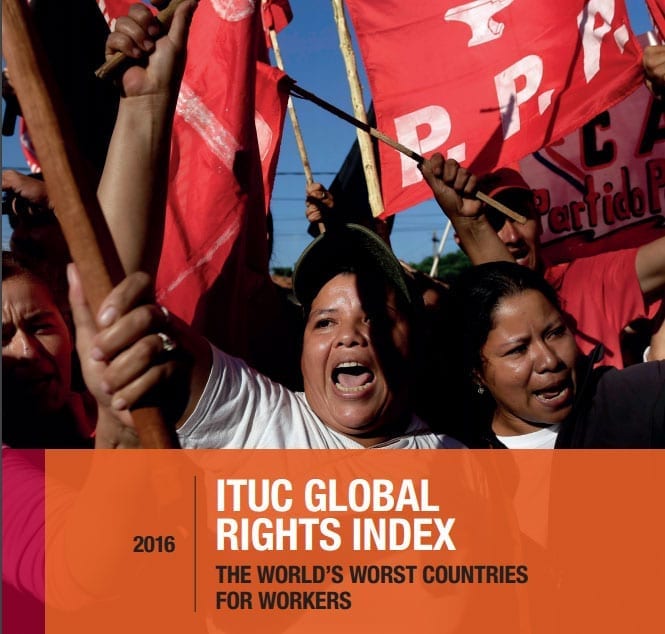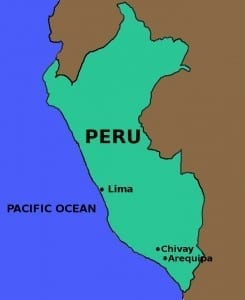
Jun 10, 2016
Workers’ rights were weakened in most regions over the past year, according to the 2016 International Trade Union Confederation (ITUC) Global Rights Index.
Repression of worker rights was compounded by restrictions on freedom of speech and assembly, including severe crackdowns in some countries, which increased by 22 percent, with 50 out of 141 countries surveyed recording restrictions.
The ITUC Global Rights Index ranks 141 countries against 97 internationally recognized indicators to assess where workers’ rights are best protected, in law and in practice.
Global Rights Index Details Chilling Repression
- Unionists were murdered in 10 countries, including Chile, Colombia, Egypt, El Salvador, Guatemala, Honduras, Iran, Mexico, Peru, South Africa and Turkey.
- 82 countries exclude workers from labor law.
- More than two-thirds of countries have laws prohibiting some workers from striking.
- More than half of all countries deny some or all workers collective bargaining.
- Out of 141 countries, the number which deny or constrain free speech and freedom of assembly increased from 41 to 50.
- Out of 141 countries, the number in which workers are exposed to physical violence and threats increased by 44 percent (from 36 to 52) and include Colombia, Egypt, Guatemala, Indonesia and the Ukraine.
ITUC General Secretary Sharan Burrow summed up the global environment this way:
“Repression of workers’ rights goes hand in hand with increased government control over freedom of expression, assembly and other fundamental civil liberties, with too many governments seeking to consolidate their own power and frequently doing the bidding of big business, which often sees fundamental rights as incompatible with its quest for profit at any expense.”
Read the full report.
Jul 26, 2013
 Public-sector workers in Peru are challenging a new civil service law that eliminates the right of more than 500,000 public administration workers to collectively negotiate salaries, narrows the definition of the type of unions they may establish and prevents “essential service” unions from striking (without defining essential services). The law also sets up a punitive annual evaluation process and provides government agencies with numerous justifications for downsizing, which public employees fear could lead to mass layoffs.
Public-sector workers in Peru are challenging a new civil service law that eliminates the right of more than 500,000 public administration workers to collectively negotiate salaries, narrows the definition of the type of unions they may establish and prevents “essential service” unions from striking (without defining essential services). The law also sets up a punitive annual evaluation process and provides government agencies with numerous justifications for downsizing, which public employees fear could lead to mass layoffs.
Congress passed Law 30057 earlier this month amid a flurry of last-minute action, surprising union leaders and progressive legislators who had crafted a compromise bill that never made it to a full vote.
When union members and their allies called for repeal of the law during peaceful marches across the country, police tear-gassed crowds, including those in Arequipa, the seat of Peru’s constitutional court. Union members are now collecting signatures to reopen congressional debate on the law and are preparing a complaint for the International Labor Organization (ILO). They also will march in July 27 rallies commemorating Peruvian independence. (Take action: Tell the president of Peru you won’t stand for the erosion of worker rights!)
In addition, public administration unions are engaging with consumer activist groups and other civil society organizations to build a shared understanding of how the law adversely impacts access to quality public services. Peruvian unions are sharing with the public how privatizing public services not only undermines quality and affordability, but also destroys public employees’ fundamental rights on the job, including access to a career path based on training opportunities.
Legislators, including a majority of the governing party, voted for the law despite concerns raised by their colleagues and public-sector unions, and the findings of an ILO technical report. The ILO found that the law suffers from an assumption that the exercise of collective rights is inherently against the public’s interest.
Peru’s public administration union federations affiliated with the Central General de Trabajadores del Peru (CGTP), along with other public-sector unions, sought dialogue with the newly formed public sector labor agency, SERVIR, after discussions about the new law began last year. Union federations affiliated with CGTP include the Intersectoral Confederation of State Workers (CITE), the Confederation of State Employees (CTE) and the National Association of State Sector Unions (UNASSE).
In coordination with global union federation, Public Service International (PSI), and the Solidarity Center, public administration workers from across Peru held forums in December 2012 to generate proposals for the law and have met regularly since, generating awareness and activism, particularly as the debates in Congress have heated up.


